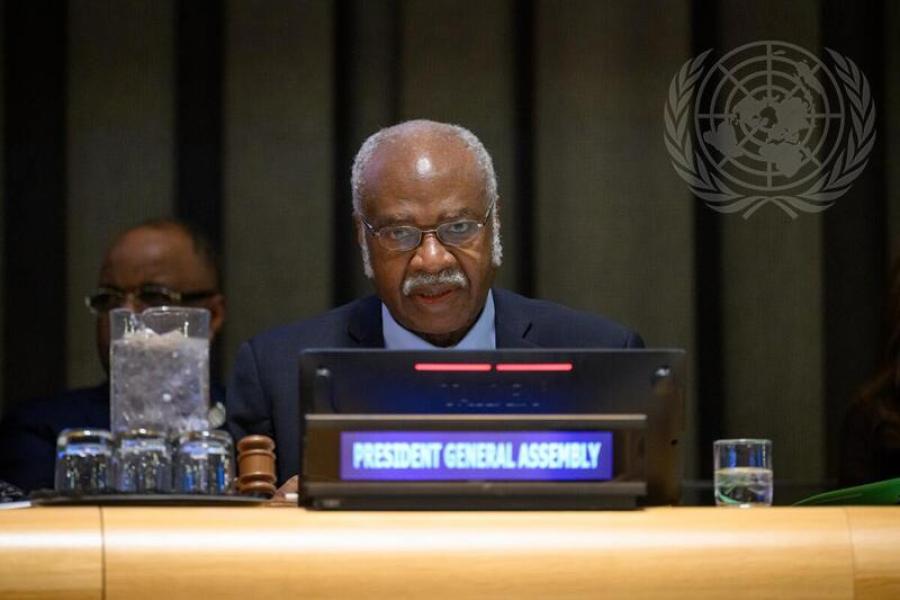“Preserving human dignity in armed conflict: Promoting compliance with international humanitarian law”
30 January 2025

Remarks by Mr. Philemon Yang, President, UN General Assembly
Thank you for joining this meeting, one of my signature events of the 79th session.
I extend my sincere appreciation to the President of the International Committee of the Red Cross for her partnership and support in organizing today’s interactive dialogue.
Preserving human dignity in armed conflict and promoting compliance with international humanitarian law are deeply interlinked.
This dynamic is evident in the work of the International Committee of the Red Cross.
Its mission – to protect the lives and dignity of people affected by armed conflict and to promote the law that protects victims of war – dates back to its founding in 1863 and to the First Geneva Convention of 1864.
Today, with the world facing the highest number of conflicts since the Second World War – and over 300 million people in dire need of humanitarian assistance – it is likewise a focus that remains essential for the General Assembly of the United Nations.
As we speak, respect for the four Geneva Conventions – the foundational treaties of international humanitarian law – is under severe strain.
From Gaza and the Middle East, to Sudan, Myanmar, Ukraine, Haiti and beyond, we see parties to conflict turning a blind eye to the rules of war.
Indiscriminate attacks on populated areas. Torture and ill treatment. The targeting of homes, schools, hospitals – even nurseries.
These violations must end. Perpetrators must be held accountable.
During the chaos, it is civilians who suffer most.
Countless lives are shattered. Millions are displaced or live under the dark shadow of airstrikes, shelling and drones. Sexual violence is used in conflict primarily against women and girls.
In 2023 alone, the United Nations recorded 33,443 civilian deaths in armed conflict – an astonishing 72 per cent increase over 2022.
The number of women killed doubled; the number of children tripled.
Of these deaths, 70 percent occurred in the Occupied Palestinian Territory and Israel making violence in this area the deadliest for civilians in 2023.
On this point, I commend the efforts of the International Committee of the Red Cross for carrying out its crucial neutral role including in facilitating the release of hostages and detainees.
The targeting of civilians is a serious violation of international humanitarian law. The targeting of civilian infrastructure can have disastrous consequences for communities and often takes decades to recover from.
Let me stress that: Even war has rules.
Rules that must not be ignored or contrived to justify violence.
The Geneva Conventions have been ratified by all Member States – they enjoy universality.
They demand that we respect civilian life regardless of our politics.
To be sure, the challenges we face are only growing more complex every day.
New technologies are giving rise to new methods of warfare, raising urgent questions about the legal consequences of their use – or their potential use.
Our actions must recognize that international humanitarian law applies to the use of all weapons systems in armed conflict, including artificial intelligence and cyber operations.
International humanitarian law is the best tool we have to pursue peace for everyone, everywhere – that is our highest calling, as the United Nations.
Last year, we marked the 75th anniversary of the Geneva Conventions.
We must not allow observance of this milestone to be reduced to words on paper.
We must use this moment to strengthen our respect for international humanitarian law.
To enhance accountability for violations.
To better incorporate international humanitarian law into national laws and systems, including through training for armed forces, and to push for universal implementation.
In the Pact for the Future, Member States vowed to protect all civilians in armed conflict and ensure accountability for violations.
I applaud the initiative by the International Committee of the Red Cross and several Member States to strengthen political commitment for respect of international humanitarian law as an important step in this direction.
These efforts will culminate in a landmark meeting to uphold humanity in war by the end of 2026, underscoring the universality of this historic legal framework.
It is a focus I wholeheartedly endorse.
In the early 1860s, Mr. Henri Dunant proposed the creation of a volunteer relief corps to care for injured soldiers.
Mr. Dunant observed, and I quote: “Our real enemy is not our neighbouring country, it is hunger, cold, poverty, ignorance, superstition and prejudice.”
His efforts grew into the International Committee of the Red Cross represented here today, as well as the global Red Cross and Red Crescent Movement, the largest volunteer network in the world.
Let us remember the very basic human reasoning behind these laws and principles and let us use these words as our call to action.
Let us return to the universal values that save lives and preserve human dignity.
Thank you.
[END]

